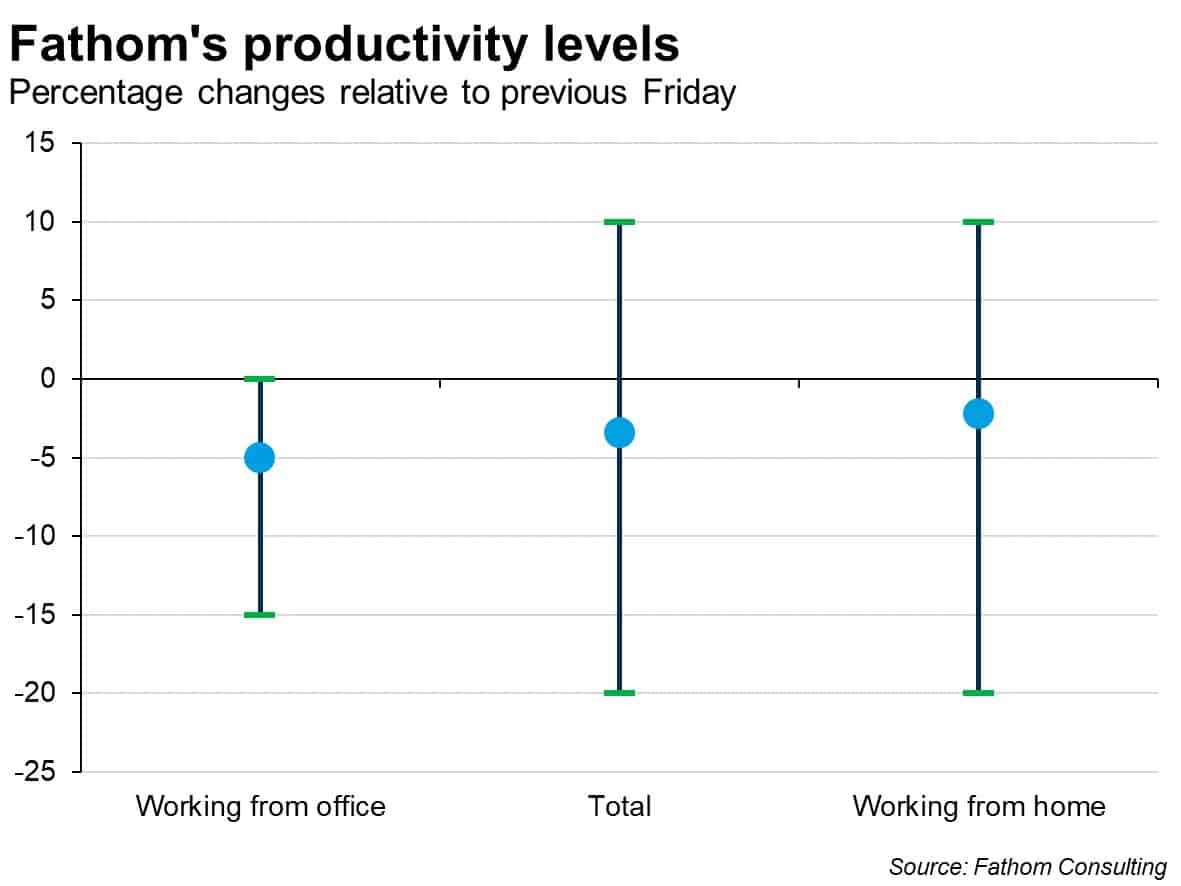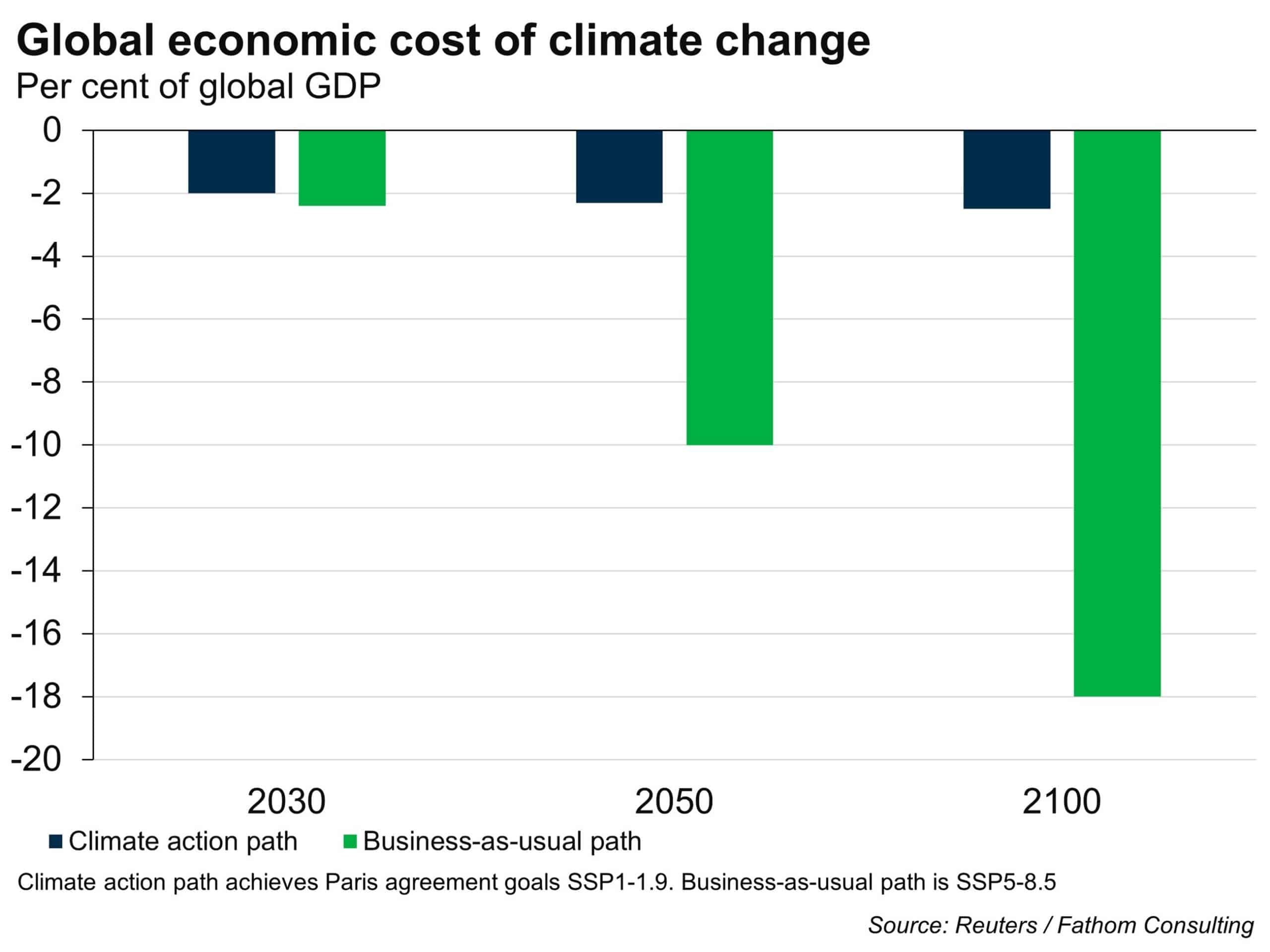A sideways look at economics
Last week was hot; the mercury touched 31°C on Friday. That doesn’t happen too often in the UK. You might think that would be cause for celebration, but no — not in Britain. In Britain, it was too hot. Yep, that’s right — if there’s a reason to complain about the weather, we’ll find it…
I asked my colleagues what impact they thought Friday’s weather had on their productivity. There were a variety of responses ranging from -20% to +10% (one colleague argued that the combination of good weather and the prospect of attending a beer festival increased the incentives to get their work done in a timely manner). On average, productivity across the company fell by 3.4%, with those working from home appearing to suffer less than those in Fathom’s air-conned HQ. Interestingly, these results are far less severe than the predictions of Nobel laureate William Nordhaus’s climate-centric DICE model, which predicted that a 6°C warming would chalk 8.5% off global GDP (though it’s possible that the Fathom survey results are somewhat biased to the downside by a reluctance to openly admit to lower productivity).

Of course, the 7°C jump in last Friday’s temperature was far larger than most expect to result from global warming. Indeed, a rise of 1.5–2.5°C now seems to be the most likely outcome (even the 2015 ‘business as usual’ projection from the Climate Action Tracker (CAT) only pointed towards a 4.5°C rise). And yet, in Fathom’s case, the economic costs of a much larger, 7°C temperature rise were relatively small. So, do we really have anything to fear from climate change?
Probably yes.
Clearly, we can’t just extrapolate a simple poll of Fathom’s staff and expect it to apply to the whole economy — unfortunately, proper economics just isn’t that easy. There are several reasons why we can’t simply extrapolate our results:
- First, we are desk-based, and roughly half the sample were sitting in Fathom’s lovely air-conditioned office. Interestingly, although those working from home typically experience smaller falls in productivity, there was much greater variation among the responses. I suspect this reflected differences in their home set-ups (one colleague working from home described themself as “hot, fed up and annoyed”). Thinking about the world outside Fathom, not every office has aircon and not everyone works in an office. Therefore, we are relatively sheltered from the effects of hot weather
- Second, we experienced just one hot day. It seems plausible to assert that the impacts would look very different if we were talking about persistently higher temperatures in steady state, as opposed to just the odd hot day.[1] Indeed, one Fathomite said they’d “had enough by the late PM”
- Third, the macroeconomic impacts of climate change are likely to be highly nonlinear and many expect them to become increasingly severe beyond certain ‘tipping points’. (In technical parlance, the economic impacts would be described as ‘kinked’.) Triggers for these tipping points might include things like an accelerated melting of the polar ice caps, rapid deforestation or declines in biodiversity
This final point highlights the primary problem with modelling the impacts of climate change — how do you quantify the economic costs beyond these tipping points? Economic damage functions either fail to account for these tipping points, or do not do so with any degree of accuracy. Moreover, the integrated assessment models (IAMs) that are typically used to assess the costs associated with climate change perform poorly when considering “fundamental structural change across a whole complex economy”. I have a great deal of sympathy with all of this, because it’s hard to quantify something that hasn’t happened yet. Of course, that won’t stop economists trying, with a recent poll by Reuters suggesting that the hit could be around 18% by 2100. That’s actually not as alarming as it sounds — if UK per capita GDP grows 1% per year for the next 75 years then the average person will be more than twice as well off as they are currently, even accounting for an 18% loss due to climate change.

But that 18% is not very precise — it could be smaller, and it could also be much, much larger than that. At this point, we just don’t know. Moreover, even if that number were right, it’s highly unlikely that the economic damage would be evenly distributed, with poorer nations likely to suffer the most. And that’s before we take into account the environmental impacts, which are clearly something we should care about in their own right.
So, how to sum this all up? Clearly climate change is bad. How bad? I’m not sure. Should we do something about it? Yes. Right now? Yes, we should. Well, maybe tomorrow[2] — for now, I want to enjoy the last few rays of sun before the rain comes, and I’m obliged to start moaning about that…
[1] There’s even an argument here that we might adapt to this new world and find ways in which to mitigate the economic costs, even if we couldn’t affect climate change itself.
[2] This demonstrates the clear difficulty in tackling climate change.